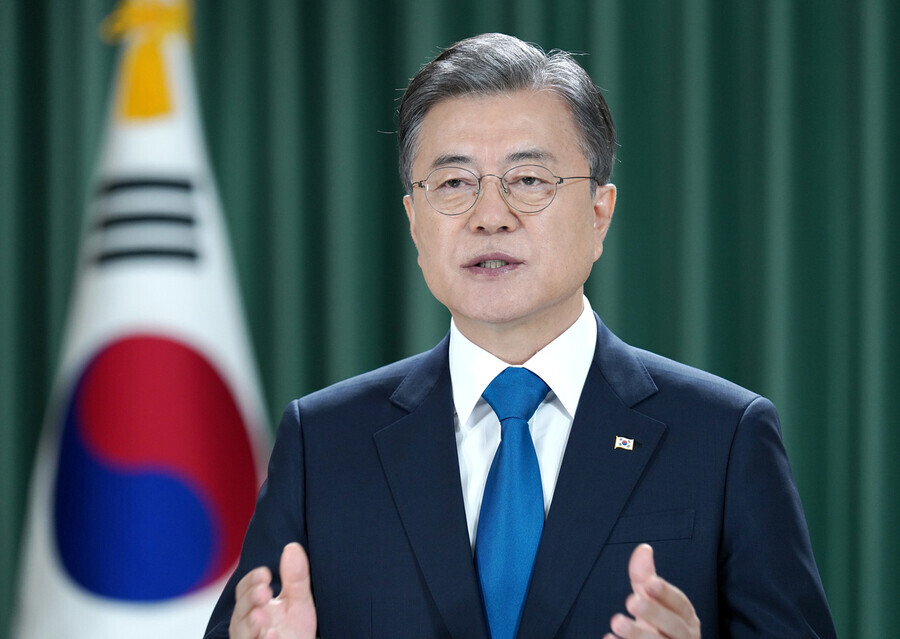hankyoreh
Links to other country sites 다른 나라 사이트 링크
S. Korea seeks telephone summits with China, Japan as US election approaches

South Korea’s summit diplomacy with neighboring China and Japan is emerging as an urgent foreign affairs issue as the US presidential election approaches in November and the COVID-19 pandemic stretches into the long term. The South Korean government is going all out to improve relations with China, which have soured in the wake of the 2017 Terminal High Altitude Area Defense (THAAD) system deployment and the “new Cold War” between Washington and Beijing. This is all coupled with souring relations with Japan sparked by issues such as compensation for forced labor mobilization survivors.
Seoul’s hopes are clear from the Blue House’s announcements regarding an Aug. 22 visit by Chinese Communist Party Politburo member Yang Jiechi and the Sept. 16 inauguration of Yoshihide Suga as Japan’s Prime Minister. Shortly after Yang’s visit, Blue House Spokesperson Kang Min-seok said the two sides had “agreed to quickly arrange a South Korea visit by Chinese President Xi Jinping once the COVID-19 situation stabilizes and the conditions are right” and “discussed the need to hold a trilateral South Korea-China-Japan summit [with South Korea as the host nation]” within the year.
Kang went on to explain that President Moon Jae-in’s congratulatory letter for Suga’s inauguration included expressions of “readiness to sit down for dialogue and communication with Japan at any time” and “hope for a positive response from Japan.” These messages effectively signaled that Seoul plans to work to arrange Xi’s visit to South Korea within the year if possible, but that if the COVID-19 situation makes conditions unfavorable, it hopes to have respective South Korea-China and South Korea-Japan summits with Chinese Premier Li Keqiang and Suga through the trilateral summit. Judging from the Blue House’s use of the term “agreed,” China appears to hold the same position. The next question is how Japan will respond.
Japanese media reports Suga is coordinating telephone summit with MoonJapanese news outlets reported on Sept. 23 that Suga was coordinating plans for telephone summits with Moon on Sept. 24 and Xi on Sept. 25. The Blue House said it could not confirm reports of the conversation schedule with Suga, but it did not deny them either. In an interview with the press, one Japanese government official said that Suga plans to “share an inaugural greeting and request [Moon’s] cooperation on resolving the issue of Japanese abductees [to North Korea],” but predicted that he would not be “addressing sensitive issues like the conscripted labor trials or export controls.” The message hinted that Tokyo does not intend to rush into improving ties with Seoul.
One interesting point concerns the agenda for the China-Japan telephone summit. Japanese news outlets reported that three matters would be discussed there: a confirmation of continued dialogue between the two sides, cooperation in response to the pandemic, and a Japan visit by Xi Jinping that was originally scheduled in April but postponed. The prevailing view among observers was that Xi’s visit was likely to be a difficult proposition amid rapidly souring public opinion toward China in Japan in the wake of the Hong Kong protests. But Tokyo has changed its stance, and is now hoping to go ahead with the visit “if possible.” Its decision has some concerned that it may be adopting a strategy of “filling in its moat”: taking a breather from its strained ties with Seoul and working to enlist allies by firming up relations with Washington and mending fences with Beijing.
Worrisome notion of the trilateral summit failing and Xi visiting Japan but not S. KoreaThe most worrisome scenario under the circumstances is one where the trilateral summit plans fizzle due to Tokyo’s uncooperativeness, while only Xi’s Japan visit ends up panning out. That situation would leave Seoul vulnerable to the diplomatic risk of having to make more concessions than needed to ensure that Xi goes ahead with his South Korea visit.
By Gil Yun-hyung, staff reporter
Please direct comments or questions to [english@hani.co.kr]

Editorial・opinion
![[Column] Season 2 of special prosecutor probe may be coming to Korea soon [Column] Season 2 of special prosecutor probe may be coming to Korea soon](https://flexible.img.hani.co.kr/flexible/normal/500/300/imgdb/original/2024/0426/3317141030699447.jpg) [Column] Season 2 of special prosecutor probe may be coming to Korea soon
[Column] Season 2 of special prosecutor probe may be coming to Korea soon![[Column] Park Geun-hye déjà vu in Yoon Suk-yeol [Column] Park Geun-hye déjà vu in Yoon Suk-yeol](https://flexible.img.hani.co.kr/flexible/normal/500/300/imgdb/original/2024/0424/651713945113788.jpg) [Column] Park Geun-hye déjà vu in Yoon Suk-yeol
[Column] Park Geun-hye déjà vu in Yoon Suk-yeol- [Editorial] New weight of N. Korea’s nuclear threats makes dialogue all the more urgent
- [Guest essay] The real reason Korea’s new right wants to dub Rhee a founding father
- [Column] ‘Choson’: Is it time we start referring to N. Korea in its own terms?
- [Editorial] Japan’s rewriting of history with Korea has gone too far
- [Column] The president’s questionable capacity for dialogue
- [Column] Are chaebol firms just pizza pies for families to divvy up as they please?
- [Column] Has Korea, too, crossed the Rubicon on China?
- [Correspondent’s column] In Japan’s alliance with US, echoes of its past alliances with UK
Most viewed articles
- 1‘We must say no’: Seoul defense chief on Korean, USFK involvement in hypothetical Taiwan crisis
- 2N. Korean delegation’s trip to Iran shows how Pyongyang is leveraging ties with Moscow
- 3‘Weddingflation’ breaks the bank for Korean couples-to-be
- 4Korea sees more deaths than births for 52nd consecutive month in February
- 5[Editorial] New weight of N. Korea’s nuclear threats makes dialogue all the more urgent
- 6[Column] Park Geun-hye déjà vu in Yoon Suk-yeol
- 7[Column] Has Korea, too, crossed the Rubicon on China?
- 8[Guest essay] The real reason Korea’s new right wants to dub Rhee a founding father
- 9Will NewJeans end up collateral damage in internal feud at K-pop juggernaut Hybe?
- 10Why Korea shouldn’t welcome Japan’s newly beefed up defense cooperation with US